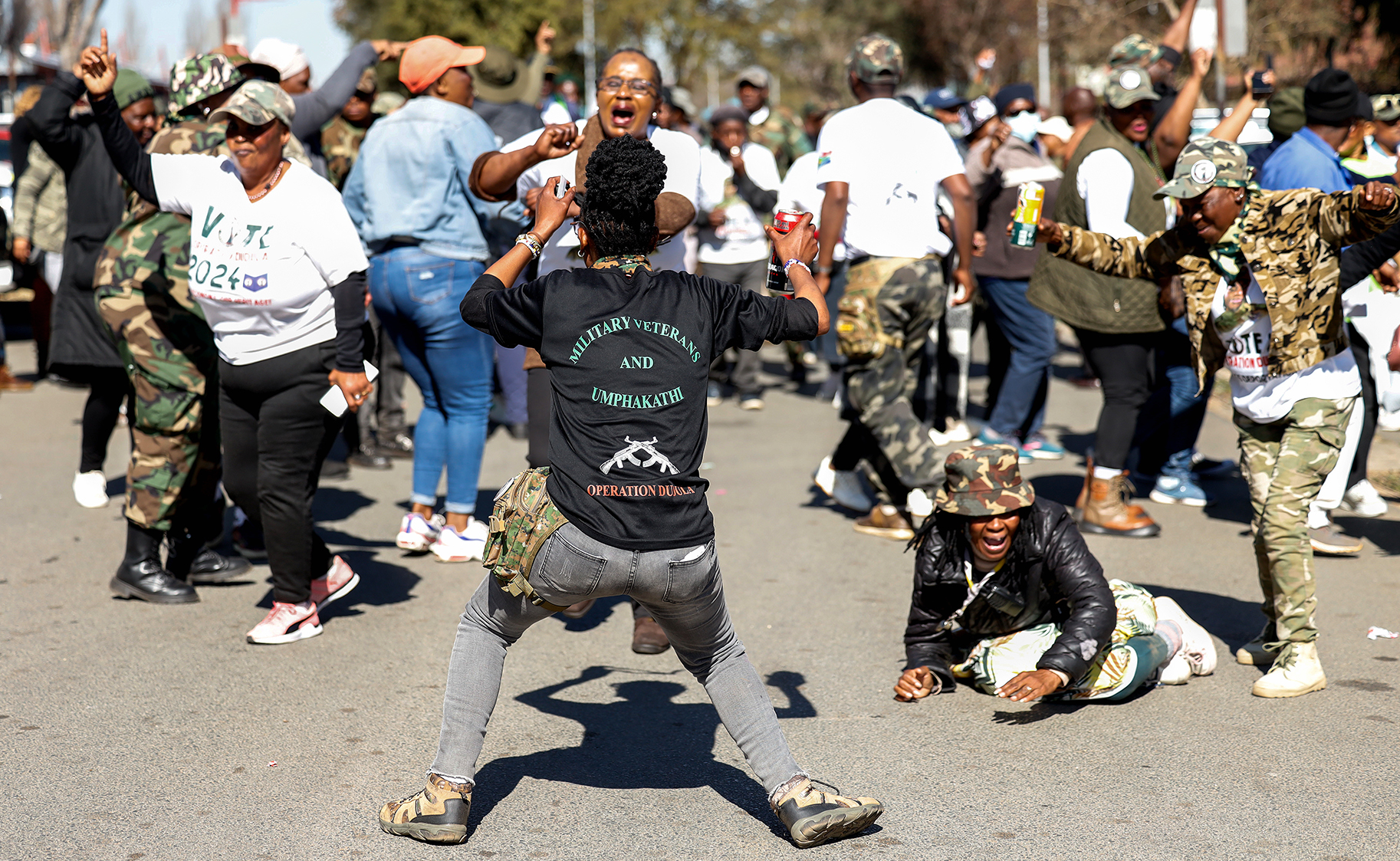South Africa is drifting into dangerous territory. The latest GovDem Survey of the Inclusive Society Institute (ISI) has laid bare a truth we can no longer ignore, namely that nearly three-quarters of South Africans say they do not trust immigrants from elsewhere in Africa.
That is not just a number, it is a warning siren. Distrust has become the majority position across every race, gender and generation. It is a national consensus of suspicion, and it is hardening fast.
In 2021, 62.6% of South Africans expressed distrust. By 2023, the figure was 67.7% and now, in 2025, it has surged past 73%. That is a jump of more than 10 percentage points in just four years. Something is shifting and not for the better.
/file/dailymaverick/wp-content/uploads/2025/08/2025-08-26-16_08_27-Greenshot.jpg)
If we continue on this path, fear, scapegoating and populism will dictate our immigration policy, and if that happens, it will not just be migrants who pay the price. Our democracy, our Constitution and our already fragile social cohesion will all be casualties.
Why the GovDem Survey matters
The GovDem Survey is not guesswork. It is one of the largest, most rigorous opinion surveys in the country. Conducted annually by the ISI, a think tank dedicated to strengthening democracy, human rights and social cohesion, and administered as part of Ipsos’ respected Khayabus Survey, it captures the voice of South Africa in its full diversity.
Around 3,600 South Africans were interviewed face to face, in their homes and in their own languages. The sample was weighted to match the national demographics of race, gender, age and geography. The margin of error (determined by sample size, response rate and sampling methodology employed) is around 2%.
The survey’s purpose is not partisan. It is to provide evidence-based insights to policymakers and the public about the state of our nation – and its latest findings are stark. Mistrust of immigrants is not confined to a single community or generation, it is national, broad-based and growing.
Distrust has no demographic borders
The details matter. The survey shows just how deep and wide the suspicion runs:
Race: Indian respondents (75.2%), black respondents (73.2%), coloured respondents (72.6%) and white respondents (72.5%) all show similar levels of distrust, which indicates that this is not one group’s prejudice, it is everybody’s problem.
Age: From 18-24-year-olds (74.1%) to over-50s (76.2%), mistrust is consistent. Young people are not more tolerant, older people are not more conservative, distrust is universal.
Gender: Women (74.3%) are slightly more distrustful than men (71.4%).
Employment: This is where the divide sharpens. Among the employed, 70% distrust immigrants. And among the unemployed, a staggering 77.3% do.
Distrust of immigrants from Africa
/file/dailymaverick/wp-content/uploads/2025/08/2025-08-26-16_08_48-Greenshot.jpg)
The conclusion is unmistakable – economic insecurity fuels resentment. When people are locked out of jobs, they naturally lash out at those they think are competing with them. However, blaming migrants for unemployment, and for that matter, failure in service delivery, is a political sleight of hand, convenient for leaders who don’t want to admit to decades of policy failure.
Populism, vigilantism and the politics of fear
This surge in hostility is no accident. It coincides with a rise in populist rhetoric and vigilante mobilisation. In recent years, groups such as Operation Dudula have turned frustration into organised campaigns to hound immigrants from workplaces, schools and hospitals. Their tactics of intimidation, harassment and even forced evictions are vigilante justice masquerading as patriotism.
And let us be blunt: this is not patriotism. It is mob rule, it undermines the rule of law, weakens state authority and legitimises illegality. Worst of all, it creates an atmosphere in which migrants become scapegoats for everything from unemployment to crime to poor service delivery.
This is the danger of populism. It thrives on a “blame culture” and creating enemies, not solutions. And when immigrants are cast as the enemy, it is our constitutional democracy, not just their rights, that comes under assault.
What the numbers demand
The GovDem Survey is more than a snapshot, it is an alarm bell. If 73% of South Africans already distrust African immigrants, and that number is rising, then we cannot afford timid responses.
The policy choices we make now will determine whether this distrust calcifies into permanent hostility or is rolled back through leadership and evidence-based governance.
The ISI believes the antidote to fear is facts and the antidote to vigilante justice is lawful governance. That means:
- Our labour laws need to be more rigorously enforced. Employers who exploit undocumented workers drive down wages and stoke hostility, and so they should face real and harsh penalties. Border management must improve, too;
- A line needs to be drawn between legal and illegal immigration, because right now, public anxiety feeds on the conflation of the two. Legal immigrants with scarce skills are an asset, but illegal entry must be addressed through stronger state capacity, because pretending they are the same serves no one;
- Vigilantism needs to be crushed. South Africa cannot allow mobs to decide who belongs here, and therefore, if government allows groups like Operation Dudula to operate unchecked, it signals that the law is optional. That is corrosive to democracy and public order;
- Policy needs to be based on accurate data. Myths and inflated numbers, such as numbers as high as 13-15 million bandied about by some senior political leaders, fuel resentment. The truth is that our immigrant population is far smaller than many believe, which must be communicated clearly and repeatedly;
- The country needs to invest in integration, and if mistrust spans every race, gender and age, then integration efforts must also be national. Public education campaigns, support for and protection of legitimate and legally registered immigrant-owned businesses, and community dialogues can help counter fear with facts; and
- The Constitution needs to be defended. Access to services and human dignity are not optional extras, they are constitutional guarantees. If fear trumps rights, we betray not just migrants, but our citizens as well.
Choosing cohesion over collapse
The 2025 GovDem Survey tells us something uncomfortable, that South Africans are more suspicious of immigrants than ever before. But it also tells us something crucial, that these attitudes are not fixed. They have worsened in response to rhetoric, misinformation and visible vigilante campaigns, which means they can also be shifted if leaders choose facts over fear.
The choice before us is stark. Either we allow distrust to deepen, normalising xenophobia as state policy, or we confront it now with courage and clarity. Either we let mobs enforce their version of “justice” or we reaffirm the rule of law.
And either we scapegoat migrants for our failures, or we tackle the real culprits, namely corruption, inequality and structural unemployment.
The GovDem Survey’s purpose is not to depress us, but to alert us. It is a mirror, and right now it shows a nation on the brink of turning fear into policy. We can still pull back, but only if we are willing to fight for evidence, inclusivity and the constitutional promise of an open and democratic society, united in its diversity.
Fear cannot govern immigration policy. If we let it, South Africa will fracture further. But if we resist it, we may yet build the inclusive society our Constitution envisions. The time to choose is now. DM
Daryl Swanepoel is CEO of the Inclusive Society Institute.
This article draws on the data contained in the soon-to-be-published ISI report, Rising distrust: GovDem Survey shows sharp increase in anti-immigrant sentiment in South Africa.





 An Operation Dudula protest outside Orlando Magistrates’ Court in Soweto on 11 August 2025 after three of its members faced charges of public violence, trespassing and violating the National Health Act after they allegedly stormed the maternity ward at Lilian Ngoyi Clinic demanding ID documents from patients to verify their nationalities. (Photo: Gallo Images / Sharon Seretlo)
An Operation Dudula protest outside Orlando Magistrates’ Court in Soweto on 11 August 2025 after three of its members faced charges of public violence, trespassing and violating the National Health Act after they allegedly stormed the maternity ward at Lilian Ngoyi Clinic demanding ID documents from patients to verify their nationalities. (Photo: Gallo Images / Sharon Seretlo)